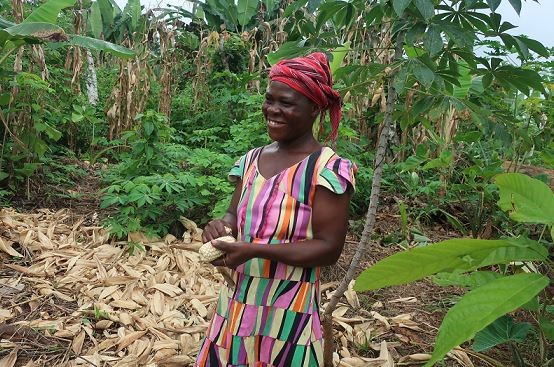This year, as the world celebrates World Earth Day on the April 22, 2020, Fairtrade Africa highlights its stakeholder collaboration towards climate action. Environmental degradation and climate change in the last couple of decades have reached alarming levels and global action is urgently needed to mininise the impact on populations, most especially vulnerable communities in the global south.
According to the UN Intergovernmental Panel on Climate Change 2019 report on Climate and Land (Chapter six), responses such as improved crop land management, diversification, agroforestry and forest management have some potential of mitigating the impact of climate change.
Climate action and sustainable agricultural practices are needed, now more than ever. Fairtrade Africa has partnered with a multi-stakeholder alliance of organisations to roll-out a project called ‘Alliances for Sankofa’. The project seeks to reduce deforestation and carbon foot prints in some cocoa growing areas, through an approach that also contributes to improving farmers’ livelihoods – recognizing that to be truly sustainable, environmental action must go hand in hand with social and economic development. Sankofa is a Ghanaian Akan word which translates as ‘going back to our roots to get what we lost along the way’.
The Alliances for Sankofa project is funded by Coop, Swiss State Secretariat for Economic Affairs (SECO), Swiss platform for sustainable Cocoa (SWISSCO) and Danish International Development Agency (DANIDA). The project is implemented by International Trade Centre’s (ITC) Alliance for Action Programme, Kuapa Kooko Cooperative Cocoa Farmers and Marketing Union Limited (KKFU), Fairtrade Africa, Chocolats Halba, Max Havalaar Foundation Switzerland, World Wild Life Foundation (WWF) Switzerland, ECOTOP Suisse GmbH, South Pole, Nature & Development Foundation (NDF), and Yam Development Council.
Alliances for Sankofa project draws on some traditional forms of farming and practices that help maintain biodiversity, enhance food security and protect natural resources: like intercropping, for example, which is an age old farming practice that was gradually abandoned over the years in favour of more modern but less sustainable techniques. The project layers these revived practices with a new climate-smart approach which promotes the protection of biodiversity through planting a variety of tree and food crops to improve soil health and inset Co2 emissions. Carbon sequestration through these actions means farmers will earn and trade carbon credits from the trees in the future. From a farmer livelihood aspect, crop diversification also enables the farmers to have year-round additional crops for household consumption as well as additional income outside the cocoa season. Crops such as yam, plantain, mango and avocado are sold by farmers on local, regional and international markets with sustainable buyer linkages promoted through the Alliances for Action approach.
The project spans from 2018 to 2023 and is being implemented with KKFU, a 100,000 member Fairtrade-certified producer organisation (PO). The project aims to establish dynamic agro-forestry and climate smart cropping systems plots covering over 400 hectares with a high diversity of crops and timber trees, directly impacting 2,900 farmers directly and 13,400 household members.
Farmers participating in this project combine various crops including food crops, tree crops, timber trees, leguminous crops and other shrubs to create a conducive environment for the soil to enhance yield and biodiversity whiles avoiding deforestation. Plots of Dynamic agroforestry are done organically without any agrochemical.
Through the pilot project proceeding Alliances for Sankofa, farmers have been able to increase their income by almost 26 percent compared to conventional practices with the added benefit of environmental conditions continuously improving the productivity of their plots. The same piece of land is expected to yield more cocoa than would have ever been the case in the past.

Emelia Debrah_ Farmer_Sankofa Project
Emelia Debrah is a farmer in Alavanyo in the Brong Ahafo region of Ghana. She was originally selling kenkey but managed to convince her husband to give her a piece of land where she started growing cocoa and yam. She is now a Lead Farmer under the Alliances for Sankofa project. Emelia has benefitted a lot from this project.
She says: “From the 2018 season, I was able to harvest maize. I recorded the highest harvested maize out of the fifteen other farmers on the project. I have used this maize and some maize bought from other farmers for my kenkey business. I sold yam, mucuna, canavalia, fresh okro and okro powder, pepper, plantain which were all grown on the same piece of land. This increased my income to about eighty percent”.
“Through this, I have been able to support my husband in the upkeep of the family. The cocoa alone was not fetching enough money for the family, but this system of alternative livelihoods has helped a lot. I have been able to register my children and grandchildren on the health insurance scheme. I have also been able to purchase adequate learning materials for my children: new school uniforms, their daily money for snacks at school and even buy them decent clothes,” Emelia added.
As this year marks the 50th anniversary of the World Earth Day celebrations, Fairtrade continues to support climate adaptation and mitigation efforts within the agricultural sector to protect farmers. Fairtrade’s mission of empowering farmers to earn a decent income and improve their livelihoods also means supporting them to overcome some of the challenges posed by the effects of climate change. Together, all partners on the Alliances for Sankofa project, this alliance aims to make a difference in the lives of cocoa farmers through sustainable cocoa production now and for future generations in alignment with the SDGs.
Pandemics and diseases like the coronavirus exacerbate the existing environmental and climate crises farmers are already battling. Most farmers depend solely on monocrop farming for their livelihood and survival – making them extremely vulnerable to climate change effects and other disruptions to their activities. We need urgent climate action to increase farmers’ resilience and better yet, empower them to grow and flourish despite the adversities they face.










